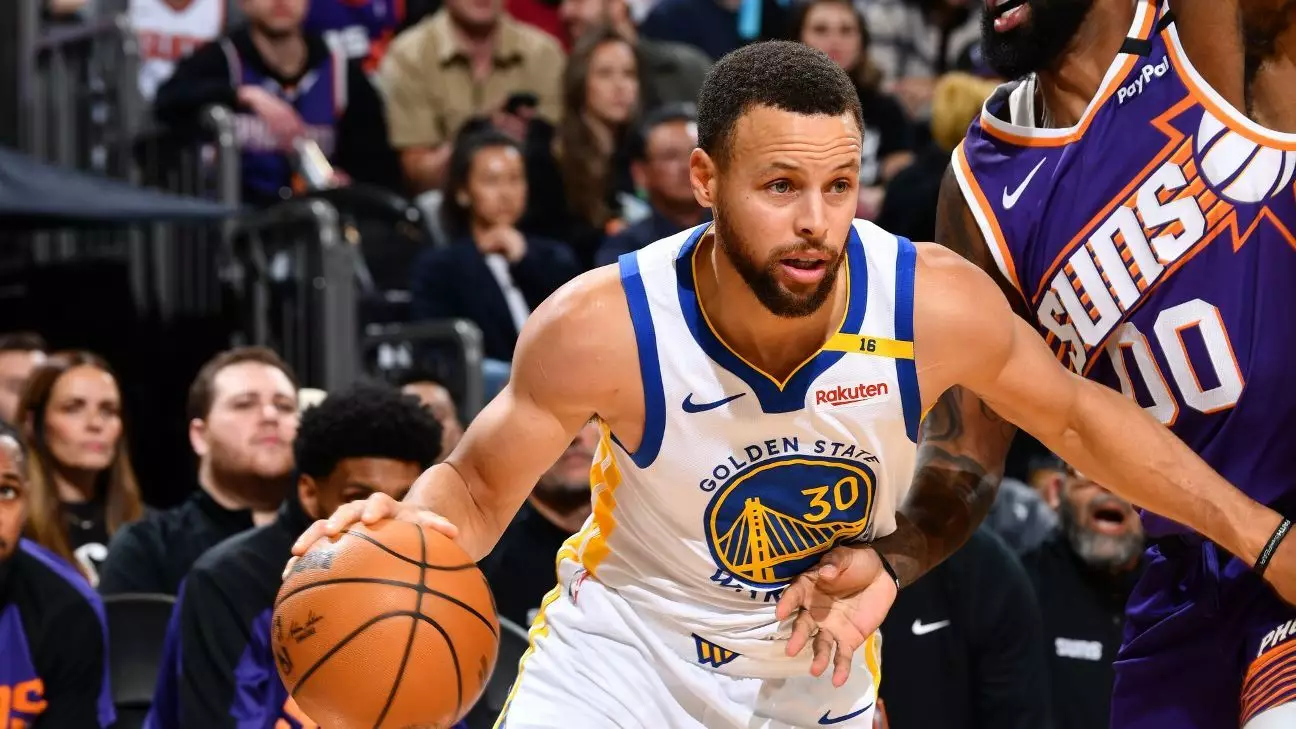As one of the premier talents in professional basketball, Stephen Curry has established himself as a pivotal player for the Golden State Warriors. However, as he navigates the challenges of athletic performance at age 36, he has begun grappling with injuries that could impact his longevity in the sport. Recently diagnosed with tendinitis in both knees, Curry’s situation encapsulates the difficult realities faced by aging athletes and raises significant questions about the management of injuries in a high-stakes environment.
For Curry, the diagnosis of bilateral knee tendinitis represents an unfamiliar challenge. Historically, the star point guard has enjoyed a career relatively free from serious injuries, making this recent condition a source of concern for both him and the Warriors. Acknowledging the potential for this type of injury to evolve into a persistent issue, Curry emphasized the need for proactive management. “It has the potential [to be] like a nagging type thing if you don’t take care of it,” he explained after a tough loss against the Phoenix Suns. The efficacy of the Warriors’ internal approach to player health, spearheaded by Vice President of Player Health and Performance Rick Celebrini, will be crucial. As Curry noted, the key lies in a protocol that allows him to manage his physical state while maintaining his competitive edge.
Understanding the nuances of balancing performance with health becomes even more critical as players age. Curry’s experience is emblematic of a broader trend in professional sports where adherence to health protocols can dictate a player’s career trajectory. Missing games may be necessary for physical preservation, but it can also diminish a player’s rhythm and the team’s overall synergy. Curry’s reluctance to sit out games underscores this internal conflict: “Honestly, I was happy to get through this one playing 30 and not feeling it go the other way.” The sentiment reflects a deep understanding of the mental and physical demands imposed on athletes, underscoring that both are integral to success on the court.
Warriors coach Steve Kerr has publicly acknowledged the complexities of managing a veteran player like Curry. At 36, the need to monitor minute counts and physical strain becomes paramount. Kerr’s approach involves collaboration with the training staff to formulate strategies for managing not only Curry’s knee issues but also the broader implications of aging in professional basketball. “This is all part of getting older and managing his minutes,” Kerr stated, reminding observers of the inevitable challenges that come with aging in athletics.
The team’s fate hinges not only on Curry’s individual performance but also on how effectively they can adapt to these changing circumstances. Whether through strategic rest days or alterations to game-day training regimens, the Warriors will need to be agile in their responses to Curry’s evolving condition. The upcoming game against the Denver Nuggets and their MVP Nikola Jokic poses an immediate test for both Curry’s health and the adaptability of the team.
As the Warriors seek to end a four-game losing streak, the importance of Curry’s role remains unconstrained despite his knee issues. His scoring output fluctuated in the game against the Suns, where he experienced an unusually slow start, scoring just two points in the first half before rallying in the second. This rollercoaster performance is representative of the realities faced by players grappling with injury management. Curry’s comment about needing to “play better in the first half” highlights the pressures players feel, both internally and externally.
Curry’s journey underlines a broader narrative that athletes, much like aging stars in other domains, must find ways to remain relevant and effective in their roles, even when faced with the trial of physical limitations. The upcoming stretch of games will serve as a litmus test, both for Curry’s knee health and the Warriors’ fortitude as they navigate this tumultuous phase of the season. Their success will hinge not just on raw talent, but on a collective commitment to adapting and evolving in the face of adversity. In sports, as in life, mastering this balance may well be the key to sustained achievement.


Leave a Reply